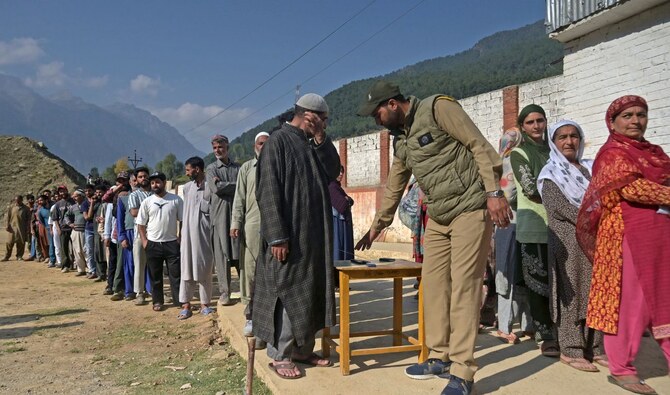SRINAGAR: Foreign diplomats from 15 countries were allowed to observe local elections in India’s Jammu and Kashmir on Wednesday, as New Delhi highlighted the first vote in the disputed Himalayan territory in a decade.
It was the first time India has invited foreign diplomats to witness voting in the region, which Prime Minister Narendra Modi’s government stripped of its partial autonomy five years ago, though Delhi has hosted similar trips on other occasions and a G20 meeting on tourism there last year.
More than 9 million voters are eligible to choose members for the region’s 90-seat legislature in the three-phase election, the second phase of which was underway on Wednesday. The vote is the first in the region since 2014.
The visitors included diplomats from embassies of the United States, Mexico, Singapore, Spain and South Korea, among others, officials in Srinagar and New Delhi said. They visited polling stations across the Muslim-majority Kashmir Valley.
“It is a rare opportunity to come to Kashmir and see the electoral process in action and see democracy. It looks very smooth, everything is very professional,” said Jorgan K Andrews, deputy chief of mission at the US Embassy.
Jammu and Kashmir is India’s only Muslim-majority territory and has been at the center of a dispute with neighboring Pakistan since 1947. India and Pakistan both claim Kashmir in full but rule it in part, after having fought two of their three wars over the region.
It has also been roiled by an insurgency that has killed tens of thousands since it began in 1989, although violence has largely abated in recent years.
Until 2019, Jammu and Kashmir had a special semi-autonomous status that was revoked by Modi’s government.
Modi’s Bharatiya Janata Party-led (BJP) government has said that the move has helped restore normalcy in the area and boosted development.
But Modi’s opponents said the visit by diplomats was not necessary.
“When foreign governments comment (on Kashmir), the government of India says this is an internal matter for India, and now suddenly they want foreign observers to come and look at our elections,” said Omar Abdullah, leader of the local National Conference party.
“Jammu and Kashmir elections are an internal matter for us and we do not need their certificate,” he said, after casting his vote.
In the past, pro-independence militants have targeted elections in Kashmir, and voter turnout has been largely weak. The territory, however, recorded its highest turnout in 35 years in national elections held in April and May, with a 58.46 percent participation rate.












